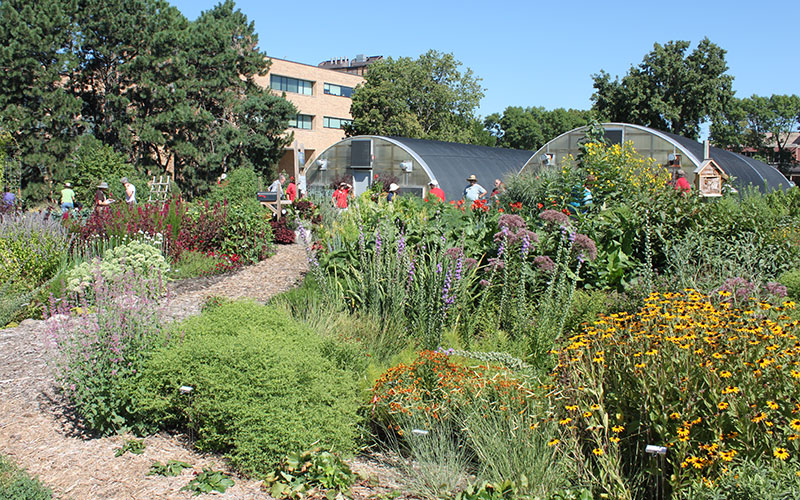Backyard Farmer How To Start Your Own Vegetable Garden

A vegetable garden can bring a multitude of benefits to your life. It can provide fresh produce, reduce your carbon footprint, and serve as a relaxing outdoor hobby. However, growing a successful vegetable garden may seem daunting, especially if you're new to gardening. Fortunately, with these 10 simple tips, you can start your vegetable garden with confidence.
How to Start Your Vegetable Garden
Before you start planting, there are a few key steps you need to take to ensure success:
Choose the Right Location
The location of your vegetable garden is crucial to its success. Vegetables require at least 6 hours of direct sunlight per day, so choose a spot that gets plenty of sun. Additionally, make sure the location has good drainage and access to a water source.
Prepare the Soil
The soil in your garden should be fertile and well-draining. Before planting, remove any weeds, rocks, or debris from the area. If the soil is compacted, loosen it with a garden fork or tiller. To improve soil fertility, add compost or aged manure and mix it into the soil.
Choose the Right Vegetables
Not all vegetables are suited for all growing conditions. Some vegetables prefer cooler temperatures, while others need warm, sunny conditions. Consider your climate and the amount of sunlight your garden receives when selecting vegetables to grow. You should also consider factors such as soil pH and nutrient levels, as some vegetables have specific requirements.
Plan Your Garden Layout
Before planting, create a layout for your garden. Consider the spacing requirements of each vegetable and plant them accordingly. Leave space between rows to allow for airflow and reduce the risk of disease. You can also use companion planting to improve soil health and deter pests.
Tips & Tricks for Successful Vegetable Gardening
Once you've started your vegetable garden, these tips can help you maintain a healthy and productive garden:
Water Regularly
Vegetables need regular moisture to thrive. Water your garden deeply once or twice a week, depending on rainfall and weather conditions. Water early in the day to reduce the risk of disease and always water at the base of the plant, rather than overhead.
Fertilize Regularly
In addition to compost or aged manure, vegetables can benefit from regular fertilization. Use a balanced fertilizer that contains equal amounts of nitrogen, phosphorus, and potassium. Apply fertilizer once a month throughout the growing season.
Monitor for Pests and Disease
Regularly inspect your garden for signs of pests or disease. Remove any damaged or diseased plants immediately to prevent further spread. You can also use organic pest control methods such as handpicking, companion planting, and insecticidal soap.
Harvest Regularly
Harvesting your vegetables regularly encourages more growth and can prevent overripening or wilting. Check your garden regularly and harvest vegetables when they're at peak ripeness.
Protect Your Garden
Protecting your garden from the elements and pests can help ensure its success. Use row covers to protect against frost or pests, and apply mulch to retain moisture and regulate soil temperature.
Frequently Asked Questions About Starting a Vegetable Garden
If you're new to gardening, you may have some questions about starting your vegetable garden. Here are some of the most frequently asked questions:
What Vegetables are Best for Beginners?
Some of the easiest vegetables to grow for beginners include tomatoes, cucumbers, beans, lettuce, and peppers. These vegetables are relatively low-maintenance and can produce abundant yields with proper care.
What are the Best Soil Amendments for a Vegetable Garden?
Compost, aged manure, and vermicompost are all excellent soil amendments that can improve soil fertility and structure. Additionally, adding organic matter such as leaves or grass clippings can add nutrients to the soil.
How Often Should I Water My Vegetable Garden?
Vegetables typically require 1-2 inches of water per week. Depending on weather conditions, you may need to water more frequently or less frequently. Water deeply once or twice a week, rather than shallowly every day, to encourage deep root growth.
How Can I Control Pests in My Vegetable Garden?
There are several organic pest control methods you can use in your garden, including companion planting, handpicking, and insecticidal soap. Additionally, row covers and netting can protect your plants from pests and frost.
What are the Best Vegetables to Grow in Containers?
Many vegetables can be grown in containers, including tomatoes, cucumbers, peppers, lettuce, and herbs. When choosing containers, make sure they have drainage holes and are large enough to accommodate the vegetable's root system.
By following these tips and tricks, you can grow a successful vegetable garden that provides fresh produce throughout the growing season. With a little planning and care, your vegetable garden can be a beautiful and productive addition to your home.


Post a Comment for "Backyard Farmer How To Start Your Own Vegetable Garden"